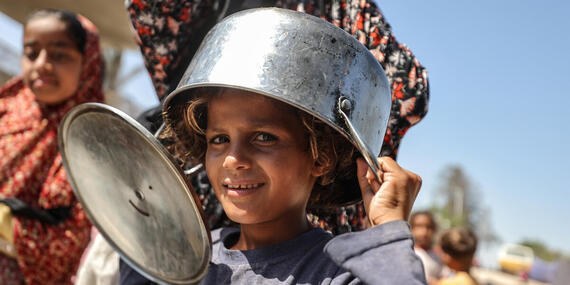Today's top news: Occupied Palestinian Territory, Syria, Sudan, Haiti

Occupied Palestinian Territory
The UN and our partners continue to respond wherever and whenever possible to the humanitarian crisis in Gaza, despite ongoing hostilities, access restrictions, impassable roads, fuel shortages and a lack of public order and safety, all of which are severely hampering aid operations.
The World Food Programme (WFP) says it has assisted about a quarter of a million people in Gaza so far this month. During the month of June, the agency provided food rations to more than a million people in Gaza.
However, limited food stocks in central and southern Gaza forced WFP to reduce rations last month, with some areas only receiving wheat flour.
So far this month, WFP has also worked with dozens of community kitchens in Gaza to provide about 1.8 million hot meals to people in central and southern Gaza, as well as Gaza city.
But the agency warns that the supplies needed for this assistance will be depleted in just days unless additional stock is received.
Meanwhile, the UN and humanitarian partners are providing critical support to displaced people crossing from northern to southern Gaza, following Israel’s latest instructions for people to leave Gaza city. This includes water, hot meals, food parcels, and health and nutrition support.
The World Health Organization (WHO) says more evacuation orders issued by Israel are further threatening the health of people who have already suffered so much.
WHO’s Director-General Dr. Tedros Adhanom Ghebreyesus said earlier today that the Al-Ahli and Patient Friendly hospitals in northern Gaza are the latest that are unable to function due to nearby fighting. Patients from Al-Ahli hospital have been evacuated to the Indonesian Hospital, which is now operating at three times its capacity.
A reminder that more than 10,000 patients still need medical evacuation for treatment that cannot be provided in Gaza.
Syria
The Government of Syria extended its consent yesterday for the UN to deliver humanitarian assistance from Türkiye through the Bab al-Hawa border crossing for an additional six months, until 13 January 2025.
OCHA says this extension is essential for the UN cross-border operation, which remains a lifeline for people in north-west Syria. Over the past year, nearly 2,000 trucks carrying UN aid have crossed from Türkiye to north-west Syria using the Bab Al-Hawa, Bab Al-Salam and Al Ra'ae border crossings.
Each month, we and our partners reach on average more than a million people with critical assistance and protection services – although this is down significantly from previous years due to growing funding shortfalls.
The Bab Al-Hawa crossing, which provides direct routes to Idleb – where more than two-thirds of north-west Syria's population in need reside – remains the most-used border crossing by the UN. So far this year, over 90 per cent of trucks carrying UN aid – and 70 per cent of missions by UN personnel, used Bab Al-Hawa to reach north-west Syria.
Also yesterday, the Resident and Humanitarian Coordinator for Syria, Adam Abdelmoula, wrapped up a three-day visit to Al Hasakeh Governorate in north-east Syria. He highlighted the growing humanitarian needs there, including due to severe water shortages and ongoing hostilities that have damaged civilian infrastructure.
Abdelmoula visited a number of humanitarian projects supported by our partners – including one of more than a dozen water filtration stations that have been installed in Hasakeh city. He also met with residents in camps for refugees and displaced people – including Al Hol, which hosts more than 41,000 people, 90 per cent of them women and children.
During the visit, he stressed that as humanitarian needs continue to increase, funding is decreasing. More than halfway into the year, the US$4.1 billion Humanitarian Response Plan for Syria in 2024 is less than 20 per cent funded, with $780 million received to date.
The Humanitarian Coordinator noted that emergency assistance alone has proven to be unsustainable and must be complemented by early recovery programming to lift people out of poverty and achieve sustainable results.
Sudan
OCHA remains gravely concerned about the deadly fighting in Al Fasher, the capital of North Darfur, Sudan – which has affected residential areas, markets, hospitals and sites hosting displaced people.
As many as 329,000 people were displaced from Al Fasher during the months of April, May and June – that’s according to the International Organization for Migration.
Once again, OCHA demands that civilians be protected. Those fleeing the fighting must be afforded safe passage. It is critical that the parties de-escalate to prevent further suffering for civilians and to enable the unimpeded delivery of life-saving assistance to those in need.
The UN and partners continue our efforts to respond to those needs, including by trying to get health kits to areas around Al Fasher, including gathering sites for displaced people. UNICEF is also putting more funding toward strengthening nutrition support at displacement sites in Al Fasher, as well as Tawila and Dar As Salam. Meanwhile, partners are working to support the water supply to Al Fasher and water facilities in the Zamzam displacement camp, as well as other sites that have seen an influx of people fleeing the fighting.
Meanwhile, the Sudan Humanitarian Fund – which is managed by OCHA – has provided funding to a local NGO to reach more than 7,000 people in Al Fasher and the Zamzam camp with shelter materials and other critical supplies.
Haiti
OCHA’s Director of Operations and Advocacy, Edem Wosornu, will brief journalists tomorrow from Haiti’s capital Port-au-Prince to provide an update on the humanitarian challenges the country is facing.
Lucia Elmi, UNICEF’s Director of Emergency Programmes, and Andrea Koulaimah, Director for Latin American and the Caribbean for the European Civil Protection and Humanitarian Aid Operations (ECHO), will also participate in the briefing, which is scheduled as part of the Daily Press Briefing by the Spokesperson of the Secretary-General at 12 p.m.
A livestream of the briefing will be available.
